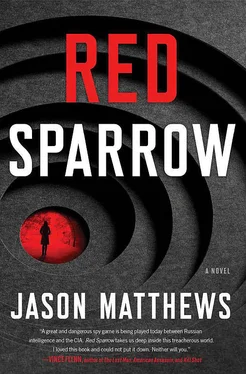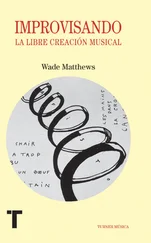The chief of Line R (Operational Planning and Analysis) was responsible for evaluating all SVR operations abroad. Alushevsky’s English was perfect, after years in London. After returning from Britain, Alushevsky had drifted toward planning and analysis because it suited him. He had an intellect and an inquiring mind. He was, thought Vanya, also a political naïf. It seemed most unlikely that Alushevsky could be the mole. Still, he had evaluated the Washington rezidentura ’s procedures in handling “the sensitive source” and it was Alushevsky who suggested the use of the Zeta countersurveillance team to protect Rezident Golov during monthly meetings. Therefore Vanya would include him in his canary-trap test.
“Boris, sit down, please,” said Egorov. He liked and respected Alushevsky for his work ethic and intelligence. “I have reviewed your recommendations regarding security upgrades in Washington, and I approve.”
“Thank you, Ivan Dimitrevich,” said Alushevsky. “General Golov is utterly professional on the street. He rarely has FBI surveillance. His assessment is that the Americans believe an officer of his rank and stature would never involve himself in agent handling. It’s an advantage to us. The Zeta Team is thorough, discreet. They will provide added protection.” Alushevsky accepted a cigarette from Egorov, offered from a mahogany box with a tortoiseshell lid.
“Excellent,” said Egorov.
“Technical officers in the rezidentura likewise are listening to FBI surveillance frequencies with special care. They especially are looking for anomalies in radio procedure. A change in tactics could indicate heightened interest by the opposition,” Alushevsky explained simply, not sure Egorov understood the nuances of the game.
“Boris, I would like you to continue monitoring the security situation and our countermeasures. We have a little extra time to assess the situation.”
“How so, Ivan Dimitrevich?” asked Alushevsky.
“I cannot discuss the details of General Golov’s case, I regret I cannot, but you surely understand,” said Egorov. “It is through no lack of confidence in you, I assure you.”
“Of course I understand,” said Alushevsky. “Security is security.” There was no trace of resentment in his voice.
“I can tell you that Golov’s source has to suspend activities for a time. A matter of illness, quite serious, actually.” Egorov looked at Alushevsky mildly.
“How long a hiatus will we have?” asked Alushevsky. “It will be important for General Golov not to become suddenly inactive. He must exactly mirror his previous activity levels. Any change in his profile could alert the opposition, and that would be doubly dangerous when the general resumes activity in the case.”
“I do not know exactly how long the agent will be inactive. Recovery from heart bypass surgery can be lengthy or quick. We shall have to wait and see.”
“With your permission, I will draft some additional thoughts for your consideration, and for forwarding to General Golov.”
“By all means, I would like to see your ideas. Please submit them as soon as you finish,” said Egorov, rising from his seat. “I repeat that I am greatly pleased with your work. Your leadership of Line R is quite satisfactory.” Egorov steered Alushevsky to the door and shook his hand.
=====
SVR Americas Department Chief General Vladimir Andreiyevich Korchnoi walked into the outer reception area of Egorov’s office twenty minutes late. Egorov’s personal aide Dimitri came out of his cubicle and shook hands. Korchnoi took in the fussed disapproval of the two secretaries sitting behind their desks, but he greeted them by name, and his deep brown eyes twinkled under his bushy white brows as he sat on the corner of one desk and told a story. “There was an announcement of the highest adultery level: First place, Movie Stars; second place, Theater Actors; third place, KGB. Someone shouts: I’ve been in the KGB for thirty years and I never cheated on my wife! Someone else shouts: It’s because of people like you that we’re in third place!”
The secretaries and Dimitri all laughed. Dimitri poured a glass of water for Korchnoi from a carafe on the sideboard. One of the secretaries was in the process of telling another joke when the leather-padded inner door to Egorov’s office opened and the deputy director appeared. The secretaries quickly bent their heads to their desks and resumed work. Dimitri nodded courteously at Korchnoi, then at his boss, and retreated into his little cubicle. Egorov surveyed the outer office.
“Quite a lot of merriment out here,” said Egorov sternly. “It’s no wonder we cannot get anything done.”
“Director, the blame is totally mine,” said Korchnoi with mock humility. “I disrupted this office with the telling of a silly story, a ridiculous waste of time.”
“Yes, and twenty minutes late on top of it,” said Egorov. “I trust you have time to speak with me now?” Egorov spun on his heel and went into his office. Korchnoi followed him, nodding at the secretaries as he walked past. The door closed behind him and the secretaries looked at each other, smiling, before returning to their work.
Egorov walked over to the blond-leather couch at the end of his suite and sat down. He patted the seat next to him, indicating that Korchnoi should sit beside him. “Volodya, are you making time with my secretaries? I bet I know which one you fancy, and let me tell you, they’re both good in bed.”
“Vanya, I’m too old and too tired to sleep with anyone these days. Besides, I wouldn’t want to follow your poxy ass in any way. I feel sorry for those young girls out there.” Korchnoi sat back in the soft sofa and unbuttoned his jacket.
“I’m pleased that you’re commencing with the planning against the American Nash,” said Egorov. “I know you will manage it well. It’s our best chance to discover the traitor.” He got up, went to an ornate cabinet, and retrieved a bottle of Georgian brandy and two glasses. He poured two shots and handed one to Korchnoi.
“This is a little early in the day, Vanya,” said Korchnoi. He reached his glass over to touch the rim of Egorov’s glass. Both men tilted back their heads and returned the glasses to the table. “No more for me,” said Korchnoi as Egorov made to refill their glasses.
“I insist,” said Egorov with mock seriousness. “It’s the only way I can get you to stay and talk with me. I need someone I trust to talk to.”
“We’ve been friends since the Academy,” said Korchnoi. “Is it something about our operation? You’re not having second thoughts about your niece. Because if that’s it, I can tell you I feel absolutely—”
“No, it’s nothing to do with the operation. I have high hopes for it. There’s something else,” said Vanya. “I have something to get off my chest.”
“Are you having troubles, Vanya?” asked Korchnoi. He would not go so far as to ask how Egorov’s campaign to supplant the sitting Director was going. Not even their decades-long relationship would give him the license to be so direct.
“The usual headaches and skirmishes. For each success we balance a failure, the loss of a source, a defection, a recruitment.”
“Vanya, you know how our business works. We will always have failures, but once every five years, ten, we will have a stupendous success. We are due another. It will come.” Korchnoi sipped at the second glass of brandy.
“That’s what I wanted to speak to you about,” said Egorov. “Volodya, I owe you an apology. I have kept something from you when I should not have. I must continue to keep something from you for a little longer, but I want to tell you a little bit.”
Читать дальше












